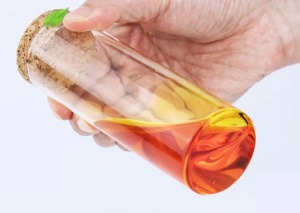The radiation-induced acute gastrointestinal injury is symptomatically treated, including non-steroidal anti-inflammatory drugs and opioids for relieving pain and glucose-containing electrolyte solution for correcting dehydration or fluid loss. Safe and effective therapeutic methods for preventing or alleviating radiation-associated enteritis are needed.
Our study found that seabuckthorn oil pre-treatment significantly increased the post-radiation survival time and mitigated acute intestinal injuries by reducing radiation-associated cell apoptosis and inflammation.
Meanwhile, seabuckthorn pulp oil and seed oil, but not olive oil, showed protective effects against radiation-induced intestinal injuries. Palmitoleic acid in sea buckthorn pulp oil and alpha-linolenic acid in sea buckthorn seed oil might be potential candidates for radiation countermeasures. Both sea buckthorn pulp oil and seed oil pre-treatment were associated with significant anti-apoptotic and anti-inflammatory effects against radiation. The finding that palmitoleic acid and alpha-linolenic acid pretreatment increased survival time indicates that the related mechanism involves palmitoleic acid and alpha-linolenic acid.
Cell apoptosis is one of the major biological effects induced by ionizing radiation. Caspases play essential roles in the execution of apoptosis. Caspase3 is a frequently activated death protease, catalyzing the specific cleavage of many key cellular proteins. It was found that pretreatment with seabuckthorn oil reduced the percentage of apoptotic intestinal cells and the activation of caspase 3. Unsaturated fatty acids are the predominant components of sea buckthorn oils, and the diverse effects of various unsaturated fatty acids on cell apoptosis have been reported in previous studies.
In most tumor cell lines, polyunsaturated fatty acids induce tumor cell apoptosis, including linoleic acid, alpha-linolenic acid, and eicosapentaenoic acid (EPA). However, EPA was reported to inhibit oxidative stress–induced chondrocyte apoptosis. Adequate alpha-linolenic acid intake increases the conversion of alpha-linolenic acid to EPA. Alpha-linolenic acid was also found to reverse endoplasmic reticulum stress-mediated apoptosis in hepatocytes.
These data indicate a cell type–dependent effect of alpha-linolenic acid on cell apoptosis. palmitoleic acid attenuates caspase activation and apoptosis following exposure to palmitate in pancreatic beta cells. Our study showed that sea buckthorn pulp oil and seed oil inhibited caspase three activations and activated the cell survival factor ERK1/2 MAP kinase, suggesting an anti-apoptotic role for alpha-linolenic acid and palmitoleic acid in radiation-induced intestinal cell apoptosis.
Alpha-linolenic acid and palmitoleic acid also showed significant anti-inflammatory effects in various tissues. Alpha-linolenic acid suppresses ultraviolet-induced skin injuries via its anti-inflammatory effect by lowering prostaglandin E2. A higher dietary alpha-linolenic acid intake attenuates the model of inflammatory bowel disease via reducing proinflammatory cytokines TNF-α, IL-1β, IL-6, and IL-8.
Palmitoleic acid also shows an anti-inflammatory ability, especially in metabolic-associated inflammation. Palmitoleic acid reduces palmitic acid–induced macrophage activation and associated p38 MAP kinase activation, improving muscle insulin sensitivity. Palmitoleic acid also attenuates high-fat diet–induced immunometabolic disturbances independently of PPAR-α.
Meanwhile, a significant reduction in the radiation-induced expression of proinflammatory cytokines, including TNF-α, IL-1β, IL-6, and IL-8 in seabuckthorn oils rich in alpha-linolenic acid and palmitoleic acid, indicating protective anti-inflammation effects for alpha-linolenic acid and palmitoleic acid.
Another experiment showed that pretreating with palmitoleic acid and alpha-linolenic acid increased the survival time compared with the control. Still, the median survival time with palmitoleic acid and alpha-linolenic acid pretreatment was shorter than that with seabuckthorn oils pretreatment. Some other components of seabuckthorn oils might enhance the anti-radiation effects of palmitoleic acid and alpha-linolenic acid.
Oleic acid is another important component in sea buckthorn pulp and seed oils. As an anti-inflammatory fatty acid, oleic acid inhibits pro-inflammatory responses in human arterial endothelial cells and modulates the reactive oxygen species production and function of neutrophils. Our study showed that oleic acid-rich olive oil improves survival compared with saline, suggesting a protective effect of oleic acid. Oleic acid may cooperate with palmitoleic or alpha-linolenic acid to reduce radiation-induced intestinal injury and increase survival time.
α-Tocopherol has been treated as a radioprotector for improving radiation-induced intestinal injury and wound healing. Even though the seabuckthorn oil α-Tocopherol content is relatively lower than its fatty acids content, α-Tocopherol might produce a synergistic effect on palmitoleic acid- and alpha-linolenic acid-mediated intestinal protection.
Overall, seabuckthorn pulp and seed oils attenuate high-dose, radiation-induced acute intestinal injuries and increase the animal survival time via mitigating cell apoptosis and acute inflammation. Two unsaturated fatty acids, palmitoleic acid, and alpha-linolenic acid might be the potential radiation countermeasure candidates for clinical radiation–associated intestinal injury management.

Leave A Comment